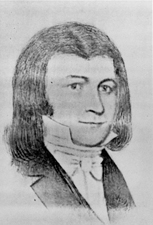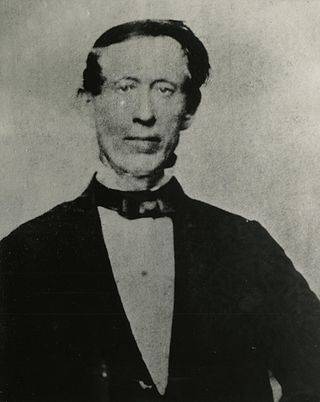Related Research Articles

Admiral William Henry Smyth was a Royal Navy officer, hydrographer, astronomer and numismatist. He is noted for his involvement in the early history of a number of learned societies, for his hydrographic charts, for his astronomical work, and for a wide range of publications and translations.

The Battle of Hampton Roads, also referred to as the Battle of the Monitor and Merrimack or the Battle of Ironclads, was a naval battle during the American Civil War.

George Henry Preble was an American naval officer and writer, notable for his history of the flag of the United States and for taking the first photograph of the Fort McHenry flag that inspired the U.S. national anthem, "The Star-Spangled Banner".

Charles Francis Adams III was an American lawyer and politician, who served as the 44th United States Secretary of the Navy under President Herbert Hoover from 1929 to 1933. He was skipper of the Resolute which won the 1920 America's Cup.

John Alsop Jr. was an American merchant and politician from New York City. As a delegate for New York to the Continental Congress from 1774 to 1776, he signed the 1774 Continental Association.
Francis BuchananFRS FRSE FLS, later known as Francis Hamilton but often referred to as Francis Buchanan-Hamilton, was a Scottish physician who made significant contributions as a geographer, zoologist, and botanist while living in India. He did not assume the name of Hamilton until three years after his retirement from India.

Franklin Buchanan was an officer in the United States Navy who became the only full admiral in the Confederate Navy during the American Civil War. He also commanded the ironclad CSS Virginia.
Genetic genealogy is the use of genealogical DNA tests, i.e., DNA profiling and DNA testing, in combination with traditional genealogical methods, to infer genetic relationships between individuals. This application of genetics came to be used by family historians in the 21st century, as DNA tests became affordable. The tests have been promoted by amateur groups, such as surname study groups or regional genealogical groups, as well as research projects such as the Genographic Project.

William Clark Russell was an English writer best known for his nautical novels.

William Randolph I was a planter, merchant and politician in colonial Virginia who played an important role in the development of the colony. Born in Moreton Morrell, Warwickshire, Randolph moved to the colony of Virginia sometime between 1669 and 1673, and married Mary Isham a few years later. His descendants include many prominent individuals including Thomas Jefferson, John Marshall, Paschal Beverly Randolph, Robert E. Lee, Peyton Randolph, Edmund Randolph, John Randolph of Roanoke, George W. Randolph, and Edmund Ruffin. Due to his and Mary's many progeny and marital alliances, they have been referred to as "the Adam and Eve of Virginia".

The Lee family of the United States is a historically significant Virginia and Maryland political family, whose many prominent members are known for their accomplishments in politics and the military. The family became prominent in colonial British America when Richard Lee I immigrated to Colonial Virginia in 1639 and made his fortune in tobacco.

Judah Dana was an American lawyer, judge and politician. He served as a United States senator from Maine and as Judge of the Maine Court of Common Pleas during the early 1800s.

Several genealogical numbering systems have been widely adopted for presenting family trees and pedigree charts in text format.

LaFayette "Fayette" McMullen was a 19th-century politician, driver, teamster and banker from the U.S. state of Virginia and the second appointed Governor of Washington Territory.

Reginald Ruggles Gates, was a Canadian-born geneticist who published widely in the fields of botany and eugenics.
Henry Townsend (1649–1703) was the son of Henry Townsend, an early settler of the American Colonies.
Peter Hagner was a clerk in the accounting office of the United States War Department, 1793-1817, and Third Auditor of the United States Department of the Treasury from 1817-1849; he served during the administrations of every president from George Washington to Zachary Taylor and was known as the "watchdog of the Treasury."

Lizzie Lape was a mid-Ohio madam who owned and operated multiple bordellos at the end of the 19th century and early into the 20th.
Dr. William Alfred Millis, LL. D., was an American educator and author. He was a native of Crawfordsville, Indiana.
Pierre Billiou was a French Huguenot born in Flanders. He was a founder of Old Town in 1661, one of the first permanent settlements on Staten Island, shortly before the Dutch colony of New Netherland became the British Province of New York. The Dutch Colonial home whose construction Billiou began in the 1660s, now known as the Billiou–Stillwell–Perine House, is landmarked as the oldest existing building on Staten Island and one of the oldest buildings in the United States. His family still lives under the modern name Bilyeu and lives in Tennessee.
References
- ↑ Genealogies in the Library of Congress: A Bibliography, Volume 1, By Library of Congress, Marion J. Kaminkow cites Henry, Ruffin, and other genealogies, comp. by Reginald Buchanan Henry, p. 754 | Marion J. Kaminkow |.
- ↑ Encyclopedia of Genealogy: Reginald Buchanan Henry
- ↑ Ancestry Magazine Jan-Feb 1998
- ↑ Genealogy Research Guides, Free Newsletters, and Ancestry Resources
- ↑ Managing a Genealogical Project William Dollarhide Genealogical Publishing Com, 1988 - Reference - 69 pages
- ↑ Numbering Systems In Genealogy 1995
- ↑ Ancestry Magazine Mar-Apr 2002